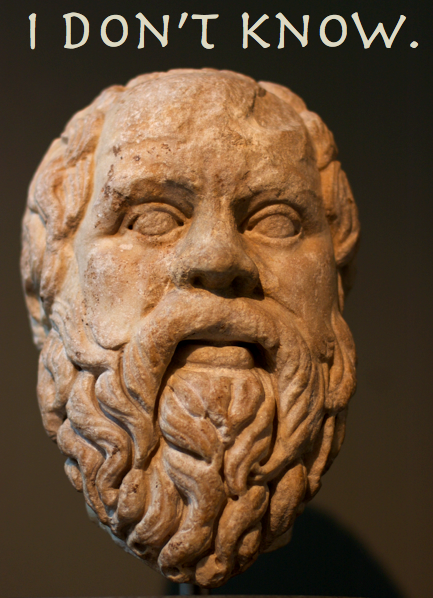Why is it so hard to admit we don’t know something? Scientists spend their lives asking questions and seeking answers; and if we don’t find the answer we pose a hypothesis, test a theory. All of these actions denote some sort of knowledge or background on a particular subject.
What if we encounter an alien in a basement? The expected reaction is to blush. Try to say some sort of scientific equivalent of, “Oh, yeah, I knew that all along.” But it turns out that’s not the right approach. It’s not even the most popular approach. We say things like that only to make ourselves feel better about not knowing something. But guess what:
It’s OK to not know something.
Operation Ivy channeled Socrates when they wrote the very philosophical “Knowledge” with the chorus, “All I know is that I don’t know, All I know is that I don’t know nothing (x4).” for angsty teenagers in the 80’s to embrace their ignorance.
“The only true wisdom is in knowing you know nothing.” -Socrates
When Socrates said it, it was novel (or at least that’s our written history) – to admit ignorance… and be completely comfortable with knowing nothing. But Socrates is also known for something very important and game changing – the Socratic Method. Easily demonstrated in Daniel Quinn’s Ishmael, the Socratic Method is used by educators (and 4-year-olds) everywhere. Ask questions. Keep asking questions. Don’t stop asking questions. Because once you ask questions of your students it gets your students (and you) thinking… and they don’t stop thinking because they are trying to answer your questions… and eventually they catch on and start asking YOU questions and – it’s wonderful.
We fear throwing ideas out into the world because we’re afraid we’ll be wrong. We’ll blush… perhaps even make a joke out of ourselves. When in reality it’s not others who make the joke out of us, it’s us – and if we take ourselves too seriously; we fall. Hard. Because we’re human – we make mistakes about what we know. We think the burner isn’t as hot as it is, until we touch it to find out. We announce that Romney has taken Ohio, when he hasn’t. The best part is that we can easily humble ourselves and shrug an “oops” into the ether and start exploring the next idea. Because once we start admitting that we don’t know everything about everything, we’ll stop being so stubborn about incorporating new knowledge into our minds. We’ll open them up. And (fingers crossed) start having open conversations that result in learning new things because we were all (finally) able to admit that we don’t know everything.

To say ‘You don’t know’ should then be supported by why or why you think you don’t know.